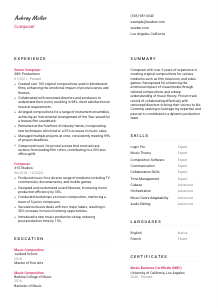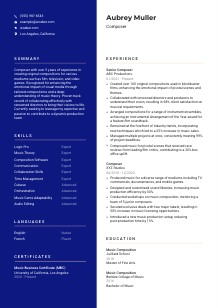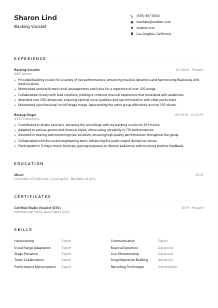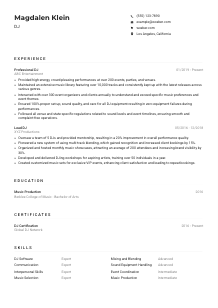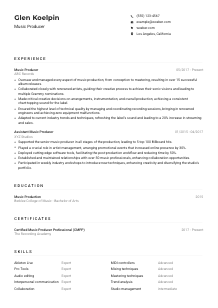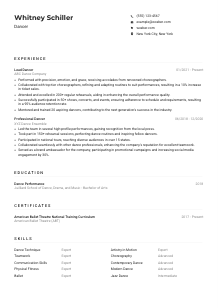Composer Resume Example
Harmonizing melodies, but your resume sounds off-key? Dive into this Composer resume example, orchestrated with Wozber free resume builder. You'll see how deftly you can score your musical spirit to hit all the right job notes, ensuring your career is always in perfect pitch!
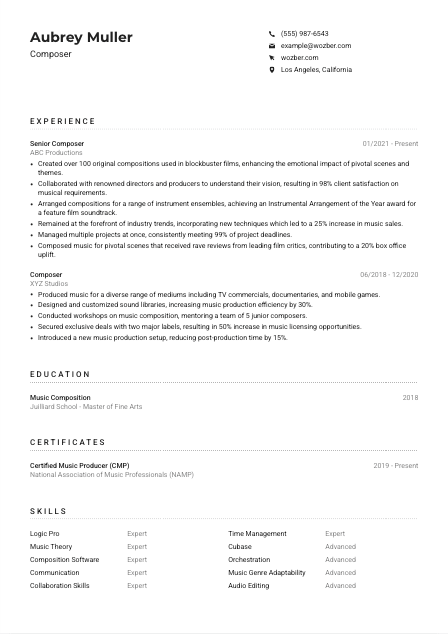
How to write a Composer Resume?
Hello, aspiring Composer! You're about to craft a symphony in the form of a resume, a piece so compelling it paves your path to your next role. With the spotlight on you and using the Wozber free resume builder, this guide will orchestrate your journey to creating a resume that hits every note perfectly tuned to your dream job's requirements. Let's conduct your success, ensuring your resume not only passes the ATS but also captures the essence of your artistry.
Personal Details
Personal Details is your opening act—setting the stage for what's to follow. Let's expertly align this section for the Composer position, ensuring your introduction is not just accurate but strikes the right chord.
1. Your Name: The Marquee
Consider your name the title of your masterpiece; it should grab attention. Opt for clarity and distinction with a readable font, making it slightly larger than the rest of the text.
2. Job Title: Tune Your Identity
Mirror the job title from the description right below your name. It's like setting your composition to the right key — in this case, "Composer" — immediately showing you're in harmony with the role.
3. Essential Contact Info: Clear Channels
Ensure your phone number and email are typo-free and professional. A confusing or casual email can be like a discordant note in an audition.
4. Location: Set Your Stage
"Must be located in Los Angeles, California." Precisely state your location to match this requirement, confirming to casting directors that you're ready for the role, no relocation needed.
5. Web Presence: Your Digital Persona
Adding a professional LinkedIn profile or a personal website where you showcase your compositions could be like an intriguing prelude, leading recruiters to discover more about your unique musical journey.
Takeaway
Your Personal Details section should set the stage for a performance that's hard to forget. It's your first interaction with the hiring team, so let it resonate perfectly with what they're seeking in a Composer.





Experience
The Experience section is your main performance, showcasing your professional crescendos. Let's score it to reverberate with the essence of what your desired Composer role entails.
- Created over 100 original compositions used in blockbuster films, enhancing the emotional impact of pivotal scenes and themes.
- Collaborated with renowned directors and producers to understand their vision, resulting in 98% client satisfaction on musical requirements.
- Arranged compositions for a range of instrument ensembles, achieving an Instrumental Arrangement of the Year award for a feature film soundtrack.
- Remained at the forefront of industry trends, incorporating new techniques which led to a 25% increase in music sales.
- Managed multiple projects at once, consistently meeting 99% of project deadlines.
- Composed music for pivotal scenes that received rave reviews from leading film critics, contributing to a 20% box office uplift.
- Produced music for a diverse range of mediums including TV commercials, documentaries, and mobile games.
- Designed and customized sound libraries, increasing music production efficiency by 30%.
- Conducted workshops on music composition, mentoring a team of 5 junior composers.
- Secured exclusive deals with two major labels, resulting in 50% increase in music licensing opportunities.
- Introduced a new music production setup, reducing post‑production time by 15%.
1. Score the Requirements
Dissect the job description like you would a new composition. Highlight phrases like "compose music for various mediums" and "collaborate with directors" to ensure your resume performs a perfect pitch.
2. Compose Your Roles
List your positions in a descending melodic structure, starting with your most recent or current role. Emphasize titles like "Senior Composer" to echo your expertise.
3. Melodic Achievements
Each job should have a list of accomplishments that synchronize with the job description. For instance, composing over 100 original pieces or enhancing music sales by 25% amplifies your impact.
4. Amplify with Numbers
Quantifying your achievements adds volume to your claims. Mentioning "creating over 100 compositions" or "increasing music sales by 25%" offers tangible proof of your capabilities.
5. Harmony in Relevance
Focus on the experiences that resonate most with the Composer role. It might be tempting to mention your guitar-playing skills, but concentrate on composition and collaboration achievements.
Takeaway
Think of your Experience section as the crescendo of your career symphony. Each point should build on the last, creating an irresistible harmony that convinces the hiring manager you're the maestro they need.
Education
A solid Education section is the foundation of your professional composition. Here's how to ensure it adds depth and resonance to your application for a Composer position.
1. Identify Key Notes
The job calls for a "Bachelor's degree in music composition." Ensure your education section hits this note clearly and precisely.
2. Compose with Clarity
Your educational background should be as clear as a well-tuned piano. Start with the highest degree and follow with the institution's name and graduation date.
3. Harmonize Details
Align your degrees with the role's requirements. If you have a Master of Fine Arts and a Bachelor's, list them in a way that showcases the progression of your musical education.
4. Extra Credits
Mention noteworthy courses or experiences that fine-tuned your skills. Perhaps you specialized in orchestration or studied under a renowned composer. These details add layers to your composition.
5. Educational Accolades
Did you graduate with honors or receive awards for your compositions? These distinctions are the melody to your education's harmony, enhancing your appeal to the recruiter.
Takeaway
Craft your Education section as if composing an essential movement of your career symphony. It's not merely about qualifications; it's showcasing the roots of your musical journey.
Certificates
In the evolving world of music composition, keeping your skills certified spells out dedication and expertise. Let's fine-tune this section to hit the right notes for a Composer role.
1. Review Script
Though not explicitly required, certifications like "Certified Music Producer (CMP)" validate your prowess and commitment to the craft.
2. Select Concise Titles
Choose certifications that orchestrate your qualifications in a relevant and impressive manner. It's about showcasing in-depth knowledge and ongoing learning.
3. Dates in the Limelight
Adding the date of certification, be it "2019 - Present", provides a timeline of your commitment and growth in the composition field.
4. Continuous Crescendo
The music industry evolves, and so should you. Regularly updating your skills and certifications keeps your resume in tune with industry standards and ahead of the curve.
Takeaway
Think of your Certifications section as a selection of high-notes, each proving your commitment to excellence and continuous improvement in the ever-changing music composition landscape.
Skills
The Skills section is your riff in the music world, a quick showcase of what you bring to the stage. Here's how to ensure it hits all the right notes for a Composer role.
1. Decoding the Scale
Extract skills from the job posting such as "proficient with composition software" and "strong understanding of music theory." This ensures you're speaking their language.
2. Your Ensemble
List skills that directly harmonize with the job description. Mixing hard skills like "Logic Pro Expert" with soft skills like "Exceptional Communication" creates a well-rounded profile.
3. Organize Your Score
Keep your skills section organized and focused. Concentrate on those that will make conductors—and hiring managers—take notice.
Takeaway
Your Skills section is like the crescendo in your career composition. It should be powerful and leave the hiring manager with no doubt you possess the mastery needed to excel as a Composer.
Languages
In the orchestra of your career, being multilingual adds an exotic instrument to your repertoire. Let's ensure the Languages section tunes into the composition of your career.
1. Review the Score
For a Composer, being "Proficient in English communication" is key. Highlight your proficiency in English, but also consider the melodies other languages might add.
2. Principal Languages
List English at the top, marked "Native" or "Fluent." This directly hits a required note from the job listing.
3. Supporting Instruments
If you speak additional languages, list them too. Each one is a testament to your versatility and capacity to collaborate in diverse environments.
4. True Pitch
Be honest in your self-assessment. Whether you're "Fluent" or at a "Basic" level, clear depiction of your language skills sets the right expectations.
5. Global Harmony
Consider how your multilingual abilities could play a part in global collaborations or projects. Even if not explicitly required, they can elevate your profile in the eyes of a recruiter.
Takeaway
Your language skills offer a world of possibilities. Let them be the chords that connect you to opportunities and resonate with the global demands of a Composer.
Summary
The Summary is your resume's overture, setting the tone for what follows. Let's compose a compelling piece that immediately captivates and signals you're the Composer they're seeking.
1. The Prelude
Initiate with a bold, engaging statement about your profession and the unique melodies you've brought to life through your experience.
2. The Composition
Incorporate key themes from the job description, like "creating original compositions" and "collaborating effectively with renowned directors," to echo the requirements.
3. The Crescendo
Shine a spotlight on your most notable achievements. Perhaps how your compositions contributed to a 20% box office uplift for a film, echoing your ability to enhance visual media emotionally.
4. The Recapitulation
Wrap your summary succinctly, ensuring it's a harmonious blend of your experience, skills, and the unique value you bring to a Composer role.
Takeaway
Think of your Summary as the opening theme of your career symphony. It sets the stage, inviting the audience in, and leaves them eager to hear the rest. With this guide, your resume will sing with clarity, purpose, and undeniable talent, ready to captivate your next employer. Now, take the stage with Wozber's free resume builder and ATS resume scanner, crafting an ATS-compliant resume that conducts your career to its next standing ovation.
Launching Your Composer Journey
Congratulations, you've refined every section of your resume into a masterful composition, ready to resonate with the hearts and minds of your future employers. Remember, your resume is a reflection of your career's greatest hits—a collection that's uniquely yours. Fine-tune it with your distinct flair using a Wozber free resume builder, including ATS-friendly resume templates and ATS resume scanner for optimal ATS optimization.
The stage is set, and the spotlight is yours. It's your time to shine; let the world revel in the symphony of your professional journey.

- Bachelor's degree in music composition or a related field.
- Minimum of 3 years of professional experience in composing music for various mediums such as film, television, or video games.
- Proficient with industry-standard composition software and music production tools like Logic Pro or Cubase.
- Strong understanding of music theory, orchestration, and different musical genres.
- Exceptional communication and collaboration skills to work effectively with directors, producers, and other team members.
- Proficient in English communication.
- Must be located in Los Angeles, California.
- Create original compositions to enhance the emotional impact of visual media, tailored to specific scenes and themes.
- Collaborate with directors and producers to understand the vision and musical requirements of a project.
- Arrange compositions for different instruments and ensembles as needed.
- Stay up-to-date with industry trends and techniques to ensure music remains current.
- Manage time and prioritize work to meet project deadlines.






